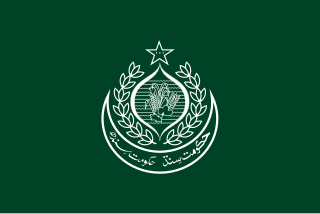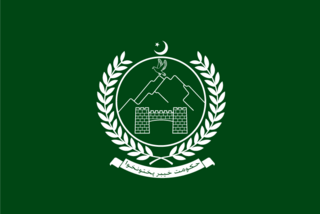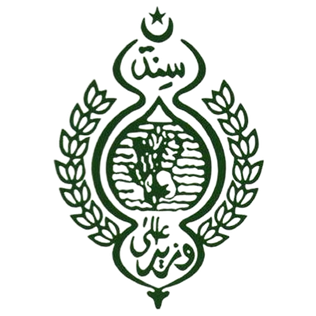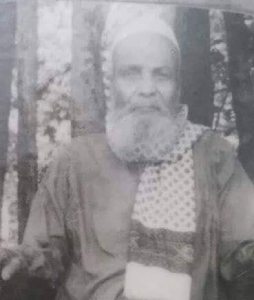Related Research Articles

Sind was a province of British India from 1 April 1936 to 1947 and Dominion of Pakistan from 14 August 1947 to 14 October 1955. Under the British, it encompassed the current territorial limits excluding the princely state of Khairpur. Its capital was Karachi. After Pakistan's creation, the province lost the city of Karachi, as it became the capital of the newly created country. It became part of West Pakistan upon the creation of the One Unit Scheme.

The Constituent Assembly of India was elected to frame the Constitution of India. It was elected by the 'Provincial Assembly'. Following India's independence from the British rule in 1947, its members served as the nation's first Parliament as the 'Provisional Parliament of India'.

The Provincial Assembly of Sindh is a unicameral legislature of elected representatives of the Pakistani province of Sindh, and is located in Karachi, its provincial capital. It was established under Article 106 of the Constitution of Pakistan having a total of 168 seats, with 130 general seats, 29 seats reserved for women and 9 seats reserved for non-Muslims.

The chief minister of Khyber Pakhtunkhwa is the head of government of the Pakistani province of Khyber Pakhtunkhwa. The chief minister leads the legislative branch of the provincial government, and is elected by the Provincial Assembly. Given that he has the confidence of the assembly, the chief minister's term is for five years and is subject to no term limits. Muhammad Azam Khan is the current caretaker chief minister of Khyber Pakhtunkhwa.
The governor of Sindh is the appointed head of the province of Sindh, Pakistan. The office of the governor as the head of the province is largely a ceremonial position; the executive powers lie with the chief minister and the chief secretary of Sindh.
Sir Ghulam Hussain Hidayatullah KCSI was a colonial Indian and Pakistani politician from Sindh. He held several offices in Sindh including 1st Chief Minister (1937–1938) and being re-elected as 5th Chief Minister (1942–1947).
Muhammad Ayub Khuhro was a Pakistani politician who served as the Chief Minister of Sindh for three terms, and as the Defence Minister in the Feroz Khan Noon Ministry.
Shazia Jannat Marri is a Pakistani politician and Federal Minister for Benazir Income Support Programme. She had been a member of the National Assembly of Pakistan from August 2018 till August 2023 and was the Minister for Poverty Alleviation and Social Safety. Previously she was a member of the National Assembly from July 2012 to August 2013 and again from August 2013 to May 2018. However earlier in September 2023, her house was raided by the National Accountability Bureau (NAB) and 97 Billion rupees cash was recovered from her possession.

Provincial elections were held in British India in the winter of 1936-37 as mandated by the Government of India Act 1935. Elections were held in eleven provinces - Madras, Central Provinces, Bihar, Orissa, the United Provinces, the Bombay Presidency, Assam, the North-West Frontier Province, Bengal, Punjab and Sind.

After power transformation, on 15 August 1947, Jawaharlal Nehru assumed office as the first Prime Minister of India and chose fifteen ministers to form the First Nehru ministry.

Chief Minister of Sindh, is the elected head of government of Sindh. Maqbool Baqar is the current Chief Minister of Sindh, serving as a caretaker since 17 August, 2023.
Bombay Legislative Assembly came into existence in 1937, as the legislature of Bombay Presidency, a province of India. It functioned until 1960, when separate states of Maharashtra and Gujarat were formed.

The Legislatures of British India included legislative bodies in the presidencies and provinces of British India, the Imperial Legislative Council, the Chamber of Princes and the Central Legislative Assembly. The legislatures were created under Acts of Parliament of the United Kingdom. Initially serving as small advisory councils, the legislatures evolved into partially elected bodies, but were never elected through suffrage. Provincial legislatures saw boycotts during the period of dyarchy between 1919 and 1935. After reforms and elections in 1937, the largest parties in provincial legislatures formed governments headed by a prime minister. A few British Indian subjects were elected to the Parliament of the United Kingdom, which had superior powers than colonial legislatures. British Indian legislatures did not include Burma's legislative assembly after 1937, the State Council of Ceylon nor the legislative bodies of princely states.
Abdul Sattar Pirzada was a Pakistani politician and administrator who served as the Chief Minister of Sindh between May 1953 and November 1954. He also served as the Chairman of the Pakistan Cricket Board (PCB) between September 1951 and July 1953 before becoming chief minister. His son, Abdul Hafeez Pirzada, is known as the architect of Constitution of Pakistan.

Ibrahim Ali Chatuli was a Bangladeshi Islamic scholar, politician and social reformer. He was the Education Minister of Assam Legislative Council, and an elected Member of the Assam Legislative Assembly belonging to the Jamiat Ulema-e-Hind political party. His constituency joined the East Bengal Legislative Assembly after the Partition of India in 1947.
References
- ↑ Vohra, Ranbir (2012-12-19). The Making of India: A Political History. M.E. Sharpe. ISBN 978-0-7656-2985-2.
- ↑ "List of members of the Sindh legislative assembly 1946" (PDF).